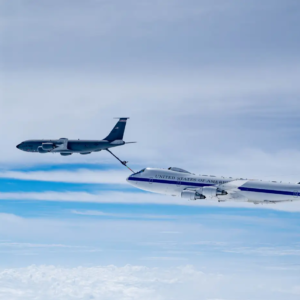Spotting a particular type of aircraft in the sky could send chills down your spine. Known colloquially as the “Doomsday Plane,” the E-4B “Nightwatch” serves as a powerful symbol of the U.S. military’s readiness for nuclear disasters and extreme emergencies. Designed to act as a National Airborne Operations Center (NAOC), the E-4B ensures that crucial leadership, including the President and Secretary of Defense, remains in control even during catastrophic events. Here’s everything you need to know about the E-4B, why its presence is a cause for concern, and what its existence means for national security.
What Is the E-4B “Nightwatch”?
The E-4B is a heavily modified Boeing 747-200. Unlike Air Force One, which serves diplomatic and state visit purposes, the E-4B is all about survival and operational control in the face of a nuclear catastrophe. Its mission is to provide a mobile and resilient command center for top officials, ensuring that the U.S. leadership can manage operations even in extreme and unforeseen situations. This aircraft is designed not only to survive but also to maintain command, communicate with ground forces, and strategize even in the worst of scenarios.
Why Spotting the E-4B in the Sky Is an Ominous Sign
If the E-4B is flying overhead, it could mean that something significant and serious is unfolding, such as:
- A Nuclear Strike is Imminent: In such dire circumstances, the U.S. government prepares to manage a global-scale crisis. The presence of the Doomsday Plane would mean that contingency measures are already in place.
- High-Level Officials Being Evacuated: The E-4B often transports senior government officials to secure locations where they can continue essential operations without the risk of exposure to danger.
- Unparalleled Emergencies: Its appearance signals a worst-case scenario that may leave civilians with only moments to react. This suggests that a serious and unprecedented emergency could be underway.
 Credit: US Air Force
Credit: US Air Force
The Cutting-Edge Capabilities of the Boeing E-4B
The E-4B is not an ordinary aircraft; it is a marvel of engineering, equipped with advanced features that enable it to fulfill its purpose even under extreme conditions:
- Thermal and Nuclear Shielding: The aircraft’s body is fortified to withstand the effects of a nuclear blast, including electromagnetic pulses (EMP) that could disable most other electronic systems.
- In-Flight Refueling: This allows the E-4B to remain airborne for days at a time, sustaining continuous operations during prolonged emergencies.
- A Flying Command Center: Inside the plane, there are advanced communication systems, a battle staff room, briefing areas, and private offices that function as secure decision-making hubs.
- 67 Satellite Dishes and Antennas: The E-4B houses these sophisticated communication tools to ensure constant and secure interaction with ground forces, submarines, and other military units.
How the E-4B Operates
Each E-4B is manned by a highly trained 60-person crew, which includes military officials, communication specialists, and technical experts. Their job is to maintain an uninterrupted chain of command and operational control in even the most extreme situations. The plane contains private quarters for senior officials, ensuring they can rest and strategize effectively during prolonged operations.
The E-4B is always prepared for action, with engines running continuously, ensuring that it can take off within minutes of an alert. While the operational costs are high—amounting to $159,529 per hour of flight—the cost is justified by the critical mission it serves for national security.

Credit: US Air Force
Why You Might See the E-4B in the Sky
While the E-4B’s presence often evokes fear and speculation, it isn’t always a sign of an impending disaster. The aircraft also plays important roles such as:
- Facilitating International Travel: The Secretary of Defense frequently uses the E-4B for travel between military installations and international destinations.
- Conducting Military Drills and Training: The E-4B is often deployed in routine training exercises to ensure readiness and operational preparedness across various branches of the armed forces.
However, during moments of geopolitical tension, seeing this plane might raise concerns about high-alert readiness, signaling the possibility of significant emergencies or national security threats.
What to Do If You See the E-4B
If you notice the E-4B flying under unusual or suspicious circumstances, it’s wise to stay informed. Follow reliable news outlets and government updates to stay aware of any developing situations. While the plane’s presence does not guarantee imminent catastrophe, it serves as an indicator of high-level military readiness and precaution.
 Credit: US Air Force
Credit: US Air Force
A Symbol of Preparedness and Resilience
The E-4B “Nightwatch” stands as a chilling reminder of the lengths a nation will go to ensure leadership continuity and operational control during emergencies. It’s a symbol of advanced planning, technological resilience, and strategic readiness, designed to protect top U.S. officials and maintain order even in extreme and catastrophic situations.
Although spotting the Doomsday Plane may be unsettling, it also signifies the dedication of the U.S. military and defense systems to safeguarding national interests and ensuring stability. It emphasizes the commitment to preserving command and control under all circumstances, reminding us all that readiness for national security threats is a top priority—even in the most unimaginable situations.
